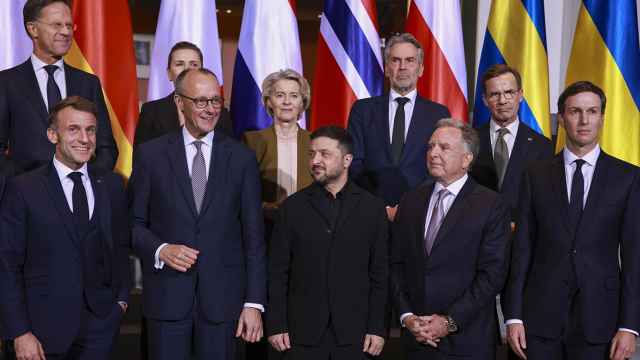The head of the St. Petersburg police was sacked following an investigation into the beating death of a 15-year-old boy while in custody, amid an ugly power struggle that came to a head at the annual meeting of police brass with President Dmitry Medvedev.
Medvedev, who had made police reform one of his signature achievements during his term — which is set to end in May — said efforts to clean up the police would continue after he departs.
"This is not the end of changes, but we have gone through the most essential part," he said Friday at an annual round table with high-ranking police officials.
But the address was overshadowed by the firing of Mikhail Sukhodolsky — a former deputy interior minister — whose ouster was announced in a statement issued during the meeting, with no reasons given for why he had been sacked.
Riot-gear clad OMON police forcibly evicted Sukhodolsky from his St. Petersburg office, after storming the building as Medvedev delivered his address to officers in Moscow.
Police sources told Kommersant that the firing was made into a highly public display after Sukhodolsky failed to attend the Moscow meeting.
"I was kicked off after 22 years of service," Sukhodolsky told Moskovsky Komsomolets in an interview published Saturday. "If things like that can be done with a colonel general, it is very sad."
Sukhdolsky's department had been under investigation by inspectors from Moscow since January after officers, allegedly under orders from local police precinct head Denis Ivanov, fatally beat 15-year-old Nikita Leontyev, who was detained on suspicion of robbing a woman.
Sukhodolsky had publicly criticized the probe as "illegitimate," arguing that it was brought on the eve of the presidential election to distract attention from the failure of reform efforts.
Observers say the boy's beating had likely been used as a pretext to force out Sukhodolsky, who had publicly clashed with his boss, Interior Ministry head Rashid Nurgaliyev, and had plotted to replace him as ministry head after the presidential election.
United Russia Duma Deputy Alexander Khinshtein told Novaya Gazeta early last week that "the real aim" of the commission was "to get rid of Sukhodolsky and not to allow his return to Moscow."
As the investigation in St. Petersburg raged on, police in Moscow conducted searches at branches of the police-run Okhrana service which provides official security protection under contract to businesses and individuals.
The service, which has annual profits of about 1 billion rubles ($33 million), was overseen by Sukhodolsky during his tenure as deputy interior minister.
Yevgeny Vyshenkov, deputy head of the St. Petersburg Agency for Investigative Journalism, said that while Nurgaliyev appeared to be using the boy's death to get rid of a rival, Sukhodolsky's record in St. Petersburg had been mediocre at best.
"He got used to office work and didn't know how to work on the ground, and three people he brought with him didn't make it thorough the process of re-evaluation," Vyshenkov said, referring to the re-evaluation of police officers instituted during Medvedev's reforms.
The reforms Medvedev initiated in 2011 are the most visible achievements of his term and have resulted in cutting 20 percent of the 1.2-million-person police force, boosting salaries and changing the forces name from militia to police.
Nurgaliyev said Friday that 147 police generals had been fired during the reform, 44,000 officers have voluntarily left the service and 56,000 more were rejected by re-evaluation commissions.
Speaking to top police officials on Friday, Medvedev said he expected officers to work harder after receiving pay raises.
"We are expecting adequate and hard-working labor," Medvedev said.
But the president has stated that police reform "will be finalized only when the activities of the Interior Ministry correspond with the demands of society."
According to a poll by the state-owned VTsIOM pollster conducted in October, public trust in the police has jumped 20 percent since 2009, although 61 percent still see them in a negative light. A November poll, conducted by the Public Verdict watchdog, however, found that only 6 percent of citizens were satisfied with the police.
"There are some positive things, but they are not large enough to be covered by such a big label as 'reform,'" Vyshenkov noted.
Many police officers acknowledge the need for reform, but say the force is clannish and resistant to change from outside.
"The police is such a well-organized structure and has many punitive structures, so we will be able to clean ourselves up," one Moscow police officer said.
A Message from The Moscow Times:
Dear readers,
We are facing unprecedented challenges. Russia's Prosecutor General's Office has designated The Moscow Times as an "undesirable" organization, criminalizing our work and putting our staff at risk of prosecution. This follows our earlier unjust labeling as a "foreign agent."
These actions are direct attempts to silence independent journalism in Russia. The authorities claim our work "discredits the decisions of the Russian leadership." We see things differently: we strive to provide accurate, unbiased reporting on Russia.
We, the journalists of The Moscow Times, refuse to be silenced. But to continue our work, we need your help.
Your support, no matter how small, makes a world of difference. If you can, please support us monthly starting from just $2. It's quick to set up, and every contribution makes a significant impact.
By supporting The Moscow Times, you're defending open, independent journalism in the face of repression. Thank you for standing with us.
Remind me later.





